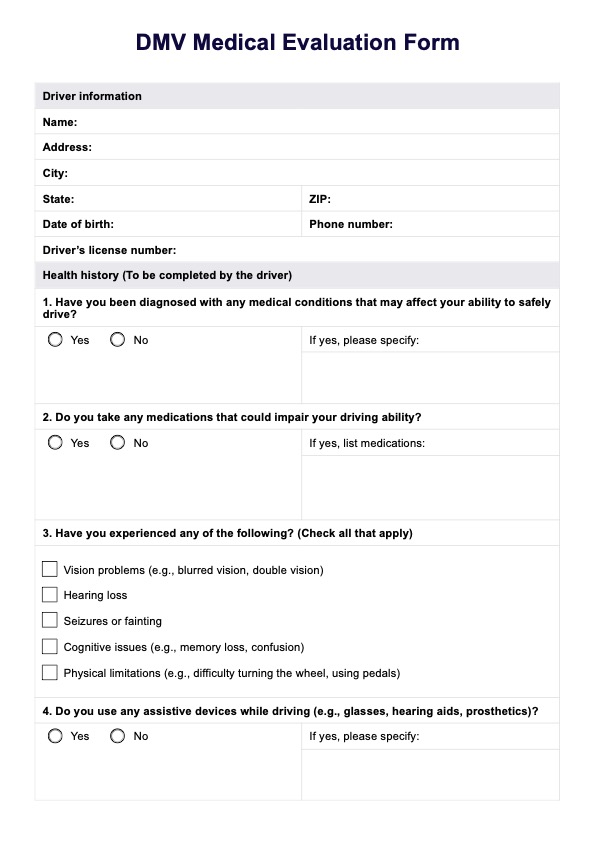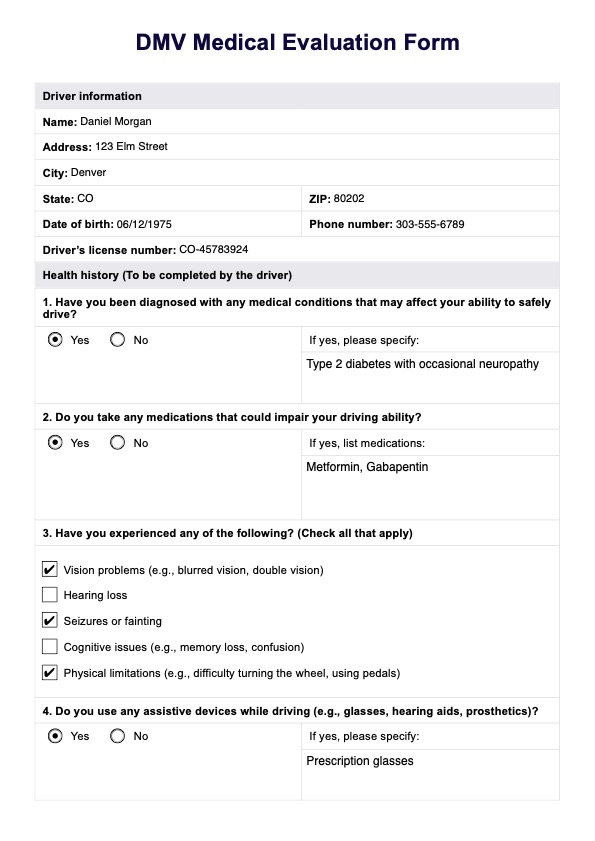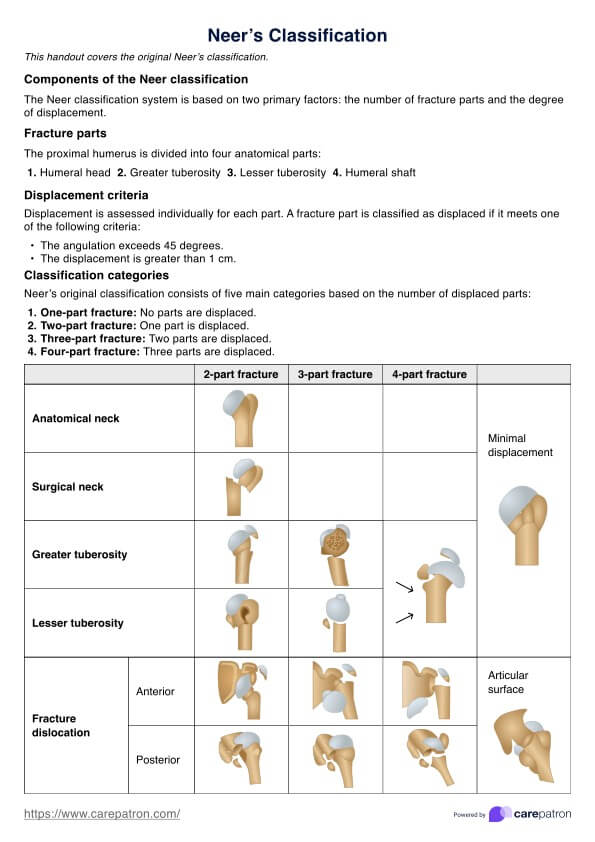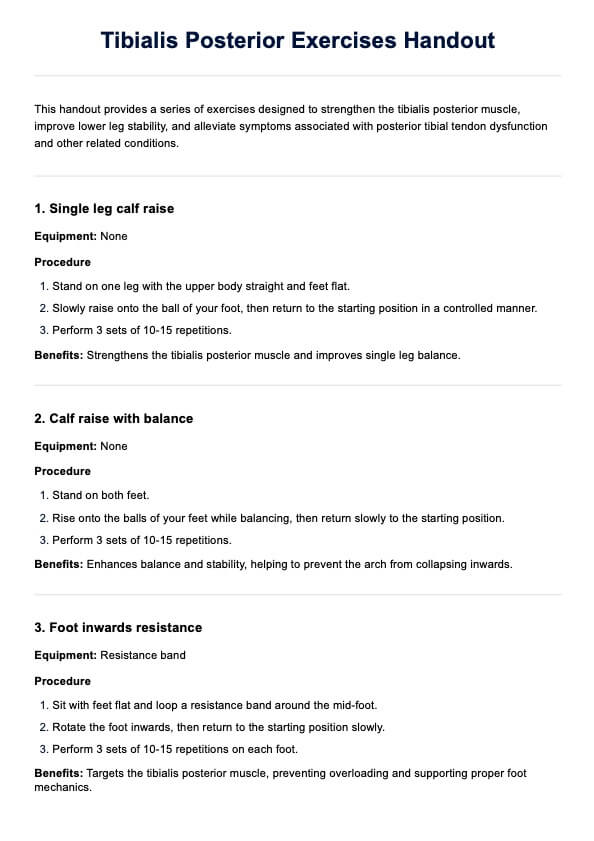DMV Medical Evaluation Form
Get our free DMV Medical Evaluation Form to assess driver fitness and ensure road safety compliance.


Why is it essential for drivers to attend a routine medical evaluation?
Routine medical evaluations and driving tests are crucial for assessing a driver’s ability to operate a vehicle safely. The Department of Motor Vehicles (DMV) uses medical examination reports and evaluation forms to determine driving fitness. These evaluations help identify physical or mental conditions that may affect a person’s ability to safely drive.
If concerns arise, the DMV may request an evaluation, refer drivers for further tests, or involve hearing officers to review license eligibility. Accurate form submission is vital, as non-compliance can result in suspension or loss of driving privileges.
DMV Medical Evaluation Form Template
DMV Medical Evaluation Form Example
What is a DMV Medical Evaluation Form?
A DMV Medical Evaluation Form is a document used by the DMV to a medical report and assess a driver's physical or mental fitness to operate a motor vehicle safely. This form typically requests information about the driver's medical history, current health status, and any conditions affecting their driving ability.
The specific contents of the DMV Medical Evaluation Form may vary depending on the jurisdiction, but common elements include:
- Personal information: Name, address, date of birth, driver's license number, etc.
- Medical history: Details about any medical conditions the driver has or has had.
- Current medications: Information about any medications the driver takes, including dosage and frequency.
- Physician's evaluation: A section for a healthcare professional to assess the driver's physical and mental health, including any specific recommendations or restrictions related to driving.
- Signature: The driver's signature indicates that the information provided is accurate to their knowledge.
- Healthcare provider's signature: The healthcare professional conducting the evaluation confirms their assessment and recommendations.
After completing the DMV Medical Evaluation Form, it the report is usually submitted to the DMV as part of the driver's license renewal process or in response to a specific DMV request due to concerns about the driver's medical fitness to drive.
The DMV uses the information on the form to determine whether the driver meets the necessary criteria to maintain their driving privileges or if further evaluation, assistance, or restrictions are warranted.
How does our DMV Medical Evaluation Form template work?
Follow these five simple steps to use our template for your DMV medical evaluation effectively needs:
Step 1: Access the template
The first step is to click the "Use template" button on this page for an editable version. This button opens the template in the app's template editor, which allows for customization to address specific needs efficiently. Click "Download" for a PDF format.
Step 2: Fill out driver information
Begin by accurately entering the driver’s personal details, including their full name, address, contact information, and license number. Double-check the accuracy of all submitted information to avoid processing delays.
Step 3: Complete the health history section
Provide a comprehensive health history for the driver, including details of any chronic conditions, past illnesses, or ongoing treatments. This section is vital for evaluating the driver's ability to safely operate a motor vehicle. Clear and thorough documentation ensures the DMV receives a complete picture of the driver’s medical background.
Step 4: Conduct and record the medical examination
As the healthcare provider, complete the medical examination section of the form. Record vital signs, relevant test results, and any observations about the driver’s physical and mental health. Ensure all fields are filled out legibly and accurately, as incomplete or unclear entries could lead to further inquiries from the DMV.
Step 5: Submit the completed form
Once the form is finalized, submit it to the designated DMV department following their specific instructions. Retain a copy for your records and advise the driver to follow up if confirmation of receipt is required. Timely submission is crucial for maintaining the flow of the evaluation process and addressing any concerns promptly.
What are the benefits of having this form?
The DMV Medical Evaluation Form offers several benefits for both drivers and regulatory authorities:
Road safety
By assessing a driver's physical and mental fitness to operate a motor vehicle, the form helps ensure that only individuals capable of driving safely are granted or retain their driving privileges. This contributes to overall road safety by reducing the risk of accidents caused by medical conditions or impairments.
Early detection of health issues
Completing the form requires drivers to review their medical history and current health status. This process of examination can lead to the identification of previously undiagnosed medical conditions or the need to adjust existing treatment plans. Early detection and management of health issues can improve overall health outcomes.
Legal compliance
For regulatory authorities such as the DMV, the form is a standardized tool for assessing drivers' fitness to drive. It helps ensure compliance with legal requirements and regulations governing driver licensing and road safety.
Transparent communication
The form facilitates transparent communication between drivers and healthcare professionals. It provides a structured framework for documenting medical information relevant to driving ability, ensuring that all necessary details are captured and considered during the evaluation and diagnosis process.
Informed decision-making
The form enables informed decision-making by regulatory authorities by providing comprehensive information about a driver's medical history and health status.
Risk reduction
Identifying drivers who may pose a higher risk due to medical conditions or impairments allows regulatory authorities to implement appropriate measures to mitigate risk. This may include additional testing, medical restrictions on driving privileges, medication, or periodic reevaluations to monitor changes in health status.
Commonly asked questions
A Driver Medical Evaluation (DME) is a medical document used by the California DMV to assess an individual's physical and mental health and ability to obtain and drive safely.
The DMV sends the evaluation form to the individual, who completes the first page and then has their physician complete the rest. The completed form is then submitted to the DMV for review to determine if a license suspension is warranted.
The DMV can only suspend driving privileges if a doctor is there is a connection between the medical condition and safe driving. Factors considered include the nature of the condition, its permanence, and its impact on driving ability.







































































































